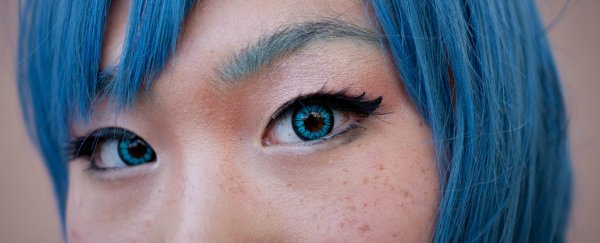People with blue eyes may be more likely to become alcoholics than dark-eyed individuals, a new study suggests. And the researchers may have also found a genetic overlap that could explain the link.
This is the first study to find a direct connection between eye colour and alcoholism, and the results need to be replicated before we get too carried away, but the team from the University of Vermont in the US hopes the findings will provide insight into the underlying causes of alcoholism.
The researchers noticed the link after studying the eye colour of 1,263 European Americans who had been diagnosed with alcohol dependence. They found that people with light coloured eyes - which they classified as grey, green, blue and brown in the centre - were far more likely to be alcoholics than those with dark brown eyes. And individuals with blue eyes had the highest rates of alcoholism of all.
Even after carefully controlling for variables such as age, gender, and different ethnic and geographic backgrounds, the association remained.
They also found a "statistically significant" interaction between the genes for eye colour and those previously associated with alcoholism. This means that one set of genes influences the effect of other genes.
"This suggests an intriguing possibility - that eye colour can be useful in the clinic for alcohol dependence diagnosis," one of the lead researchers, Arivis Sulovari, said in a press release.
The data used in the research were taken from a database filled with the genetic profiles of patients with at least one psychiatric illness, such as depression, schizophrenia, or drug or alcohol dependence. From this set, the researchers focussed only on 1,263 individuals with a European background who had been diagnosed with alcoholism.
The results have been published in the American Journal of Medical Genetics: Neuropsychiatric Genetics (Part B).
The next step is to replicate the results to show that the link really does exist. A Georgia State University study in 2000 also found that people with blue eyes drank more than individuals with other eye colours, but the researchers will need a lot more to go on.
But if they can confirm the link, the big challenge will be working out whether it's caused by genetics, environmental factors, or a mix of the two.
This is tricky, because scientists still don't know much about the mechanisms that cause alcoholism. "These are complex disorders," said the other lead researcher Dawei Li. The genes we've identified over the past two decades "can only explain a small percentage of the genetics part that has been suggested," he added, "a large number is still missing, is still unknown."
We'll have to wait and see what comes of this work, but can we suggest in the meantime that the researchers look into whether the association still holds if someone has paid to turn their eyes blue?
